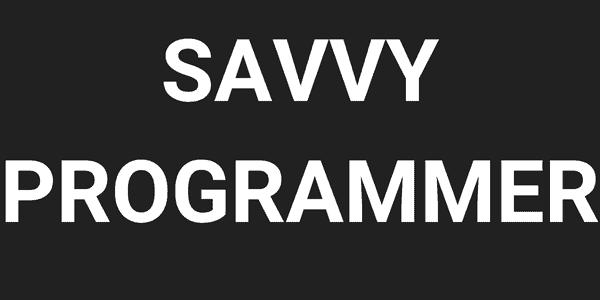If you think programming is difficult, ask Shirley M. McKerrow who gave programming a shot at the tender age of 84 by taking free online courses.
For complete beginners, programming can be intimidating. Each skill requires a certain amount of time, effort, and dedication. Coding skills are no different.
Programming enables us to build software tools. It is a way to “instruct computers to perform various tasks“. Instructions can be written in various programming languages like Java, C++, C#, Python, and many more.
Programming is fun, creative, and the backbone of technological advancements. Plus, it pays a pretty good salary.
Java programming language is a general-purpose, high-level, object-oriented computer language. It is a good choice as the first programming language as many universities teach Introduction to Computing courses using Java.
Though learning to program is not dependant on the choice of programming language, but you have got to start somewhere. In this article, we are going to learn the exact steps that an aspiring programmer should follow to gain mastery of the Java programming language.
. . .
Going Back in Time—A Brief History of Java
Developed by James Gosling and his colleagues at Sun microsystems company in 1995, Java is a front-runner among numerous programming languages. The Java project was initially pioneered in 1991 by Gosling. Back then, Java was known as “Oak” but for a short while, James Gosling called it “Greentalk” as well.
The team of Sun engineers which led the developmental work for Java was called the Green Team. The Green Team’s vision was to develop a programming language for embedded systems. A language that was simpler than C/C++ and capable of running on any environment.
The Java programs are compiled into a bytecode form rather than native machine code and executed using Java Virtual Machine (JVM). Java’s programming model strongly endorse the principle of “Write Once, Run Anywhere” (WORA).
. . .
Why Learn Java?
When learning a programming language, the goal must be to understand the programming concepts rather than memorizing the syntax. Java is a suitable language for beginners due to various reasons. Let’s discuss some of them below.
- It is easy to learn and understand syntactically and logically. Once you have basic programming knowledge, you can figure out the rest yourself.
- Java is an object-oriented programming language that is the most widely accepted programming paradigm.
- It is easy to learn also because it has a huge community of experienced developers who are willing to help novice developers all the time.
- Over the years, the Java community has built powerful development tools on top of the Java architecture. It has numerous libraries, packages, and java APIs available that make a developer’s job easier.
- Java is platform-independent which means you can Write the code Once and Run it Anywhere (WORA).
- It has extensive documentation that is refined over the last 20 years.
- It is a popular programming language and java developers are some of the highest-paid resources in the job market.
Does Learning Java Require Prior Programming Experience?
No.
This is true for any programming language.
Programming has key concepts that can be applied via any programming language to develop computer programs. One needs to know about variables, data types, loops, conditionals, and exception handling, etc
Like other programming languages, Java can be self-taught. Without any programming experience, an aspiring Java developer can learn it at his own pace. With complete dedication, an ideal time frame for learning the Java programming language is around 3 to 6 months.
There are many ways one can learn the Java programming language. But there are no shortcuts to this process. The young blood needs to put in the hard yards before they can start building quality Java applications.
Java is one of the most preferred programming languages among developers. In this guide, we’ll see how a complete beginner can learn Java with no programming experience.
. . .
1. Devise a Realistic Plan of Action
Planning is an important aspect of software development. Each software project starts with a defined plan of action. Without any clear and extensive plan, you are planning to fail.
For new Java developers, the programming journey must start with a realistic plan of learning Java. They must set up a daily studying routine along with other activities.
Learning programming must be made fun and exciting like targeting a new programming concept every week by figuring out a programming outline. While studying, they must clear all distractions to focus solely on enjoying this new experience.
Also, as some people do, don’t try to learn multiple languages at once.
. . .
2. Learn the Basics First
Don’t try to learn advanced concepts initially instead focus on the core programming concepts. One can find the basic concepts on any online platform or programming website.
Try out small Java code snippets in any online Java runtime environment. Observe the code flow in detail. Experiment with different data type values, if-else statements, while loops, for loops, nested loops, file handling, exception handling, etc.
At this point, don’t try to get your hands dirty with the OOP concepts.
. . .
3. Consistency—The Key to Success
Don’t give up.
You must have heard this a gazillion times. But consistency is the key to standing out in this world.
The first programming week is usually very exciting but the next week this excitement level may drop. Programming can only be learned by developing a habit. To keep your motivation high, always have new and exciting programming content to learn every week.
. . .
4. Write Code by Hand
Start writing Java code on paper. There are thousands of simple programming problems available online that require basic programming concepts.
Many people find it easy to memorize or remember hand-written content as it stimulates brain connections.
. . .
5. Read Interesting Java Non-Programming Content Regularly For Motivation
Programming regularly can take a toll on your mental capabilities. If you don’t feel like practicing Java code someday, try to read non-programming articles and informational blog posts related to Java or programming in general.
Reading different Java programming case studies can motivate you to develop exciting Java applications yourself. You can also attend online webinars and listen to podcasts around Java programming. The following resources can be a good place to start:
- Java Code Geeks
- Java case studies by Oracle
- Java Developers Summit
- Coder Campus podcast
- Inside Java podcast
. . .
6. Join a Local Community or Study Groups
Being part of a community of Java enthusiasts can elevate your level of motivation for learning Java every day. You can also join local study groups in your universities or in the online space through Facebook, LinkedIn, and Reddit. You can ask questions, interact with like-minded developers and help others by answering their queries.
The following communities can keep your programming spirits high:
- Oracle Java community
- DEV Java community
- Stack Overflow Java Community
. . .
7. Participate in Java Coding Challenges
Coding challenges are a great way to express your technical abilities. They can sharpen your coding skills. Many platforms offer coding challenges in the Java programming language.
The following platforms offer basic and advanced level Java (and other) coding challenges:
. . .
8. Join a Java Programming Language Bootcamp
Bootcamps can teach technical details related to programming in depth. They are like attending university lectures with a targeted outline to kickstart your programming journey. They are optimized to deliver relevant content at a fast pace to enable quick learning.
Joining a Java bootcamp can teach you foundational Java programming skills. Project-based practice sessions can build your professional portfolio and allow you to network with other people. If you want to learn Java cheaply, bootcamps are worth spending your money on.
There are many Java bootcamps out there. One should compare the outline, cost, and reviews before joining. If you are looking to learn Java by joining a bootcamp, the following platforms can be a good place to look at:
- The Software Guild Java bootcamp
- Udemy Java bootcamp
- CodingNomads Java bootcamp
. . .
9. Read Java Documentation
For any software application, product, or programming language, online documentation is considered the most authentic source of learning about it.
Java offers extensive documentation for all of its libraries, packages, and APIs. They have various getting started guides and training tutorials for mastering Java.
. . .
10. Start Reading a Java Programming Book
As they say: Books are knowledge and knowledge is power.
Java has a long list of top-quality programming books covering various aspects of this language, written by some of the most well-versed Java experts and industry veterans. You can find the best-selling Java programming books on Amazon. Some of them are:
- Effective Java by Joshua Bloch
- Head First Java by Kathy Sierra
- Beginning Programming with Java for Dummies by Barry Burd
. . .
11. Watch Java Programming Tutorials Online
In this digital age, education and learning are accessible to everyone. You don’t have to enroll in your dream college to gain knowledge and start your professional career.
Youtube is leading the online education industry. Many Java experts have created their Java programming playlists that enable hands-on coding. Many of them initiate live coding sessions where listeners can interact to resolve their queries.
You can explore some of the Java programming playlists and courses below:
- Java Tutorial for Beginners by Programming with Mosh
- Java for Complete Beginners by Cave of Programming
- Java Programming Tutorials for Beginners by Simple Snippets
. . .
12. Join a Java MOOC
MOOCs or Massive Open Online Courses have disrupted education around the globe. They offer certifications and career tracks that have helped millions of people in upskilling their portfolios and finding the right job. Many universities are offering their accredited courses through MOOC platforms.
For novice Java developers, MOOC platforms can be a good place to start. They offer self-paced, bite-sized Java programming content to enable quick learning. Even some Java experts take these courses because the IT industry values them highly and obtaining a certificate provides a sense of gratification in the end.
Some of the most famous Java Programming courses on the MOOC platforms are:
- Learn JAVA Programming – Beginner to Master by Abdul Bari
- Modern Java – Learn Java 8 features by coding it by Pragmatic Code School
- Java Programming and Software Engineering Fundamentals Specialization by Susan H. Rodger
- Object Oriented Programming in Java Specialization by Owen Astrachen
. . .
13. Start a Beginner Friendly Java Programming Project
Once you have learned the core Java concepts and watched many tutorials, it is time to apply your knowledge to real-world Java applications. You can start working on solving simple problems. Like making a calculator application, currency converter, simple hangman, brick breaker game, the famous snake game, or a to-do list application.
If you want to be adventurous, you can try your luck with more advanced yet simple projects like making a financial or banking application, any type of management system, or even an airline reservation system. You can also contribute to open-source Java applications.
The aim of working on these projects is to build your professional portfolio. You must showcase your work online using Github and other tools.
. . .
14. When Stuck-Google is Your Best Friend
If Google can’t find you the answers, there probably ain’t one.
For any type of programming query and errors, you can search on Google. Googling is one of the most underrated skills a programmer can acquire. It is often said that the difference between a junior developer and a senior developer is their googling skills.
If you know how to find the right answers, you can come out of every situation. Instead of staring at your screen for hours trying to find the loopholes and bugs in your Java program, go online and try your luck. Someone might have already faced and solved a similar problem.
. . .
15. The Best Cliche of All Time—Practice Makes Perfect
Mastering Java or any other programming language is not easy. Successful developers often invest financially, mentally, and physically to hone their programming craft. With Java, it’s not any different.
You must learn something new every day and apply your knowledge practically. Without regular practice, you will always remain an average Java developer.
. . .
Final Thoughts
In this article, we have elaborated on some of the most common ways a beginner can learn Java without any programming experience. As a newbie, you should focus on learning core Java concepts. Watch hours of valuable Java programming content on various tutorial websites.
Stick to a routine and learn Java programming every day as a ritual. If you are stuck somewhere, don’t feel shy to approach the massive online community of Java experts. You would be surprised to see how many people are willing to provide their guidance.
What are you waiting for? Download your Java development kit and start learning today.
THE END
References
- https://www.nytimes.com/2017/09/22/your-money/some-people-learn-to-code-in-their-60s-70s-or-80s.html
- https://www.webopedia.com/definitions/object-oriented-programming-oop/
- https://www.geeksforgeeks.org/difference-between-byte-code-and-machine-code/
- https://www.javatpoint.com/jvm-java-virtual-machine
- https://www.javacodegeeks.com/2013/12/java-io-in-nutshell-22-case-studies.html
- https://docs.oracle.com/javaee/6/tutorial/doc/gkgjw.html
- https://cloud.redhat.com/events/javadevsummit21
- https://www.coderscampus.com/category/coders-campus-podcast/
- https://inside.java/podcast/
- https://community.oracle.com/tech/developers/categories/13287-java
- https://dev.to/t/java
- https://stackoverflow.com/questions/tagged/java
- https://www.javacodemonk.com/tag/java-coding-challenges
- https://www.codecademy.com/resources/blog/advanced-java-code-challenges/
- https://codingbat.com/java
- https://leetcode.com/problemset/all/
- https://www.thesoftwareguild.com/coding-bootcamps/java-training/
- https://www.udemy.com/course/java-programming-become-complete-java-developer/
- https://codingnomads.co/courses/learn-java-online/
- https://docs.oracle.com/en/java/
- https://www.amazon.com/Best-Sellers-Books-Java-Programming/zgbs/books/3608
- https://www.youtube.com/watch?v=eIrMbAQSU34
- https://www.youtube.com/playlist?list=PL9DF6E4B45C36D411
- https://www.youtube.com/playlist?list=PLIY8eNdw5tW_uaJgi-FL9QwINS9JxKKg2
- https://www.udemy.com/course/java-se-programming/
- https://www.udemy.com/course/modern-java-learn-java-8-features-by-coding-it
- https://www.coursera.org/specializations/java-programming
- https://www.coursera.org/specializations/object-oriented-programming
- https://github.com/
- https://www.oracle.com/java/technologies/downloads/




